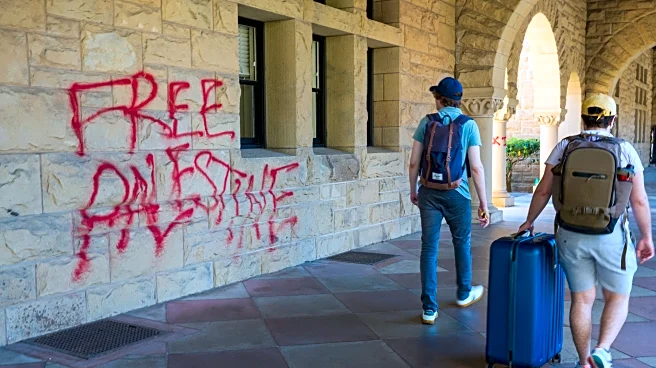What is the story about?
What's Happening?
Archaeologists are investigating the aftermath of the Toba supereruption, which occurred 74,000 years ago and is considered one of the largest volcanic events in Earth's history. The eruption, originating from Indonesia, ejected massive amounts of volcanic ash into the atmosphere, leading to global cooling and environmental changes. Researchers are using volcanic glass, known as tephra, to trace the impact of the eruption on human populations. This material helps scientists understand the extent of the eruption and its effects on human survival. Despite the catastrophic nature of the event, evidence suggests that humans adapted and thrived in certain regions, such as South Africa and Ethiopia, by developing new technologies and strategies for survival.
Why It's Important?
The study of the Toba supereruption provides insights into human resilience and adaptability in the face of natural disasters. Understanding how ancient populations survived such events can inform current disaster preparedness strategies. The research highlights the importance of adaptability and innovation in overcoming environmental challenges. It also challenges previous hypotheses that the eruption caused a significant decline in human populations, suggesting instead that humans were able to thrive despite the adverse conditions. This knowledge is crucial for developing strategies to mitigate the impacts of future volcanic eruptions and other natural disasters.
What's Next?
Scientists will continue to analyze archaeological and environmental records to better understand the conditions that allowed humans to survive the Toba supereruption. This research may lead to new insights into human adaptability and resilience. Additionally, modern programs like the USGS Volcanic Hazards Program are focused on monitoring active volcanoes to prepare for potential eruptions. These efforts aim to enhance global preparedness and response strategies, ensuring that societies can effectively manage and mitigate the impacts of future volcanic events.
Beyond the Headlines
The study of past volcanic eruptions not only sheds light on human survival but also offers lessons for contemporary society. It underscores the importance of adaptability and innovation in the face of environmental challenges. By examining how ancient humans responded to catastrophic events, researchers can identify key factors that contribute to resilience. This knowledge can be applied to current and future disaster management strategies, helping societies better prepare for and respond to natural disasters.

















